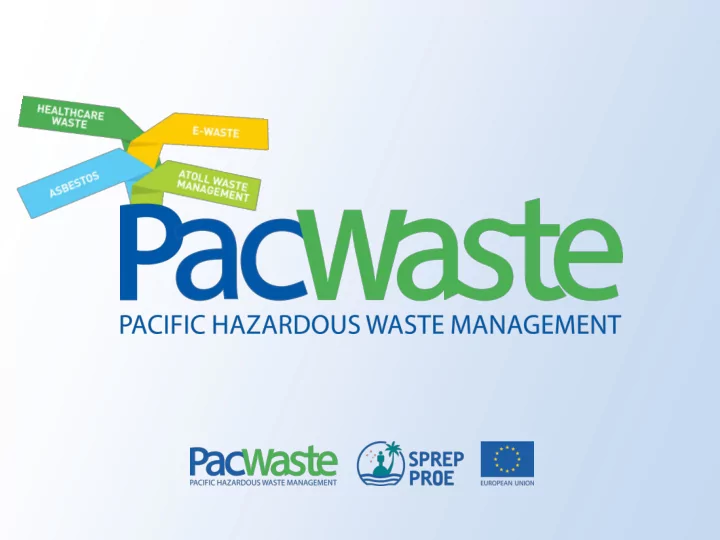

EDF 10 Pacific Hazardous Waste (PacWaste) Project • € 7.85 M SPREP administered project • 5 years (2013-2018), 15 Countries - 14 Pacific Islands plus Timor Leste • To improve hazardous waste management across the Pacific (asbestos, E-waste, medical waste) + atoll waste pilot
Healthcare Waste • Baseline studies completed at 42 hospitals (13 countries) • healthcare waste training completed for 42 hospitals • 26 Incinerators delivered, 23 installed and commissioned • Remainder to be installed under PacWaste Plus (includes non- operational incinerators)
Asbestos • Baseline surveys completed in 13 countries (26 islands) • Asbestos removal in 11 countries (73 prioritised locations) completed • Emergency clean-ups in 4 locations completed with country level training
E-waste • Baseline surveys in 9 countries • Pilot project launched in 7 countries (ULAB/e-scrap recovery) • Recycling networks initiated – shipment of ULAB to Korea in 2017
Atoll waste management • Atoll baseline study completed (RMI) • Pre-paid bag implementation • Green waste and scrap metal diversion • Waste finance introduced (CDL/ULAB buyback)
Disaster Waste • Pilot projects launched in 3 countries (Fiji, Vanuatu and Tuvalu) • Established the ground work for a regional disaster waste programme
Knowledge transfer • Twinning initiatives • Training – HCW, Asbestos • Major contributor to enhance regional collaboration in the Pacific (Inaugural Clean Pacific Roundtable with JICA) • Exchanges of best practices (Pacific to Pacific) • Five Steering Committees (Kiribati, RMI, Vanuatu, Samoa) • Awareness raising – campaigns and various media products (fact sheets, posters, country profiles, etc)
Outstanding work from PacWaste 1. Healthcare waste • Healthcare waste training • Incinerators – repairs and installations • Review the issues that have arisen with some types of incinerators deployed 2. Asbestos • Niue Asbestos Project • Continue the roll-out under PacWaste Plus 3. E-waste • Challenge is to move from collection to sale (review)
Evaluation Key Recommendations • Worthwhile and highly relevant • Tailored, sustainable and project with overall positive and innovative solutions beneficial results • Priority waste streams focus • Increased emphasis on capacity • The lessons from the findings and conclusions strongly supported the building and a move to purposeful continuation and expansion of the and competency based/certified topic under EDF 11 training • Stronger national cooperation among stakeholders; more active national oversight roles and involvement in projects
Mid Term Evaluation 2017 – Lesson Learned & Recommendations Strategy and focus 1. Tailoring solutions to countries’ needs 2. Maintaining and building on regional links and networks created will be essential for a successful EDF11 3. Focus on the stated priority waste streams , including asbestos, HCW and e-waste; also disaster, wastewater, bulky and other waste
Mid Term Evaluation 2017 – Lesson Learned & Recommendations Strategy and focus (cont.) 4. Focusing on assisting to de velop /enhance effective legislative waste management framework , since it is essential to achieve sustainability 5. Continued efforts in asbestos removal , assessing the significance of water pipe and other ACM waste not included in PacWaste 6. Increased emphasis on disaster waste 7. Developing optimal tailored solutions for managing e- waste and other wastes: requires government support, appropriate regulation and instruments and stakeholder support
Mid Term Evaluation 2017 – Lesson Learned & Recommendations Strategy and focus (cont.) 8. Increased emphasis on capacity building including: • asbestos : public awareness and training for local competent authorities staff, contractors; but removal work should be under the supervision of external licensed persons until local capacity and regulation is developed; • E-waste : public awareness and training in handling and management; • move from ad hoc to purposeful and competency based/certified training; • emphasis on train the trainer and training hubs for increased efficiency of resources and enhanced sustainability; • stronger involvement of the Academia and vocational systems
Mid Term Evaluation 2017 – Lesson Learned & Recommendations Organisation and resources 9. Sustainable financing to ensure initiatives are sustainable 10. Continue good donor collaboration at regional and national levels; maintain and develop networks 11. Ensuring sufficient resources for an appropriately qualified, skilled and supported project team
Recommend
More recommend